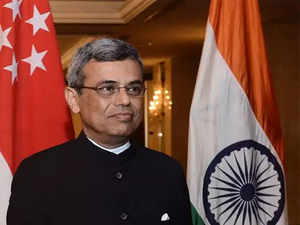Clear indication Singapore wants to diversify supply chains, needs better connectivity: Indian envoy

Ashraf said India is also trying to secure special permissions from Singapore to facilitate movement of technicians directly to the city-state.NEW DELHI: India and Singapore will have to improve connectivity in a post-corona world to boost bilateral trade ties, the Indian envoy to the Southeast Asian nation said Friday, asserting there is a “clear indication to us” that they want to diversify their supply chains and India is a priority.
High Commissioner to Singapore Jawed Ashraf said connectivity is an important way of improving tourism and investment. “Once we come out of this crisis, which will affect the aviation sector the most, we would need to take a look at how we work on connectivity projects.”
Speaking from Singapore on ‘India-Singapore Business Promotion, Challenges and Opportunities – Post Covid-19’ at a webinar organised by PHD Chamber of Commerce & Industry, Ashraf said India can look to bolster ties with the city-state in manufacturing pharmaceuticals, electronics and in health technology and food processing sectors.
“In exports, there is a clear indication to us that Singapore is saying ‘we want to diversify supply chain and you guys are priority’,” he said.
“The immediate area we were looking at was processed and fresh foods, so we are talking about fruits and vegetables, marine products and also dairy products and they (Singapore) want to diversify… and we need to work in this area,” he said.
Ashraf said India needs to see how to leverage ties with Singapore on two objectives: to achieve self-reliance and to be a part of the global supply chain.
Also, India is an area of high priority as Singapore looks at the evolving geopolitics, evolving trade tensions and the future of supply chains and markets, he pointed.
“So I can see a great opportunity for India as long as we are able to create necessary conditions. We must leverage their capacity to build industrial parks in India through which they can also bring in investments. Another area is developing logistics because Singapore has a great advantage in terms of logistics,” the Indian envoy said.
In education sector, he said, there is “a lot being done”.
“We need to get our young people to do internships together to spend time together in colleges and universities, doing social projects on climate change, afforestation, health together. We have to build this relationship with our youth to learn more about each other,” he said.
He said efforts are also being made to promote yoga and get Ayurveda the status of traditional medicine.
“That would require legislative changes. In the meantime, we have been able to get a lot of other hurdles and challenges out of the way for practice of Ayurveda and we are working with the government but legislation will continue to take some effort,” he said.
“We marked the International Day of Yoga in 120 centres simultaneously last year because instead of doing it in one large venue which makes good photo opportunity, we wanted to take it to communities, to people,” he said.
Ashraf said India is also trying to secure special permissions from Singapore to facilitate movement of technicians directly to the city-state.
During the webinar, he also talked about how religious tourism can boost ties.
Giving an example of Madurai, a city famous for its temples and often called the cultural capital of Tamil Nadu, he said it could act as a direct connection with Singapore.
“Everybody knows there is a product. You go to see a particular site but you can see it for a couple of hours. What is your totality of experience? They all become part of the experience and I think we still have a long way to go into turning India’s resources on tourism into a major tourism package,” he said.
“It is something for us to think about that a country like Singapore has nothing by way of natural resources or heritage monuments but it gets 19 million tourists for a 709 sq km. The benefits of tourism for inclusive development holds regionally as well as in terms of employment generation,” Ashraf said.
Source: indiatimes.com

